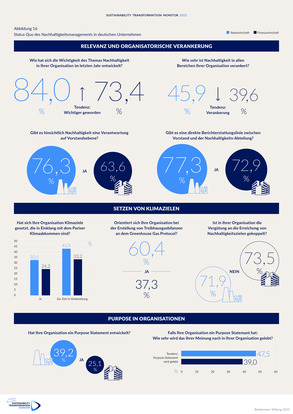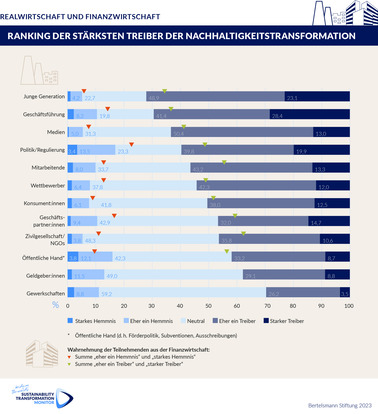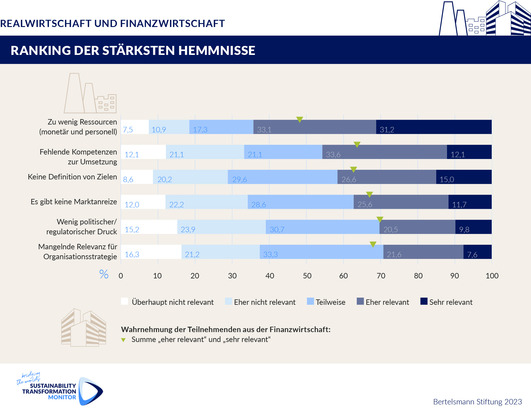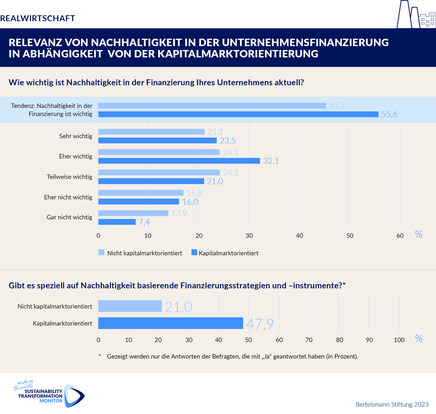12 January 2023
Results form the new Sustainability Transformation MonitorCompanies Putting Greater Focus on Sustainability
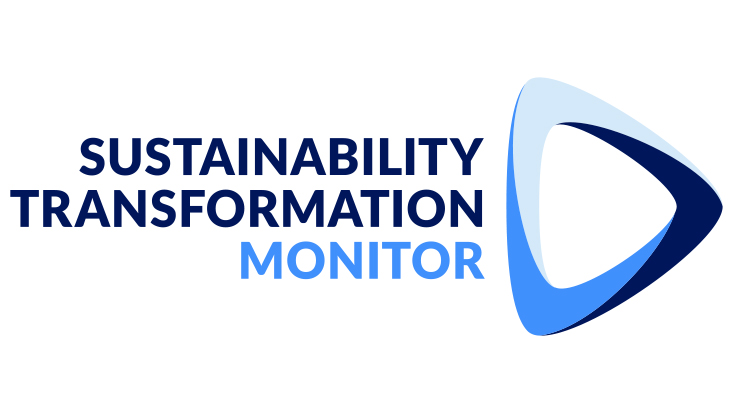
Photo: Sustainability Transformation Monitor
Just about half of those surveyed in the real economy (46 percent) say that sustainability in their companies is “completely and totally” or “largely” integrated. In business finance, the figure is still about 40 percent. More than a third say sustainability is “partially” integrated.
For the Sustainability Transformation Monitor, responses from 735 employees concerned with sustainability were evaluated between September and November 2022. Of those surveyed, 269 worked in the real economy and 467 worked in business finance in Germany. In the future, the Sustainability Transformation Monitor will take an annual look at change processes in the real economy and business finance to identify the motors, success factors, and hindrances on the path towards sustainability.
The importance of the topic to top managers is indicated by who in the company oversees sustainability. Just about 58 percent of those surveyed in the real economy say that the board is responsible. In business finance, this is true for about 49 percent of the companies. For 41 percent of those surveyed in the real economy, there is a department for sustainability; in business finance, a good 35.5 percent have a sustainability department. “The direct comparison of sectors shows that there is somewhat greater awareness of the topic of sustainability in the real economy than in business finance. But there is also a clear trend toward sustainability here, too,” says Jakob Kunzlmann, sustainability expert at the Bertelsmann Stiftung.
Thus far, sustainability has too rarely been linked with remuneration
Nonetheless, there is a lot more leverage to be used. In almost 75 percent of companies (real economy: 72 percent, business finance: 74 percent), staff remuneration is not linked to the achievement of sustainability goals. Fewer than 20 percent of those surveyed said that there is such a link for middle or top management. “There needs to be significantly greater emphasis on reaching clearly formulated sustainability goals,” says Alexander Kramer, member of the board for the Peer School. “This potential cannot remain untapped as an incentive.”
Thus far, only a third of companies in the real economy and a mere fourth in business finance have articulated concrete climate goals. However, these numbers should rocket because 43 percent of those surveyed in the real economy and 33 percent in business economics said that climate goals are “currently being formulated.” “The responses show that the Sustainability Transformation Monitor helps us to understand where the economy still needs to be transformed towards greater sustainability—especially for urgent topics such as climate protection,” explains Philipp Wesemann, the responsible project manager at the Stiftung Meracator. “The study reveals the greatest hurdles for transformation: resources and the necessary skills within the companies.” For example, 64 percent of respondents from the real economy mention the lack of financial and HR resources as a relevant hurdle.
Financiers are very interested in moving forward on sustainability
For companies oriented towards capital markets, the topic of sustainability plays a somewhat larger role than in other companies. Seventy-three percent of the former said that financiers are interested in a sustainability transformation at their respective company. Fifty-five percent said that the topic is “very important” or “rather important” with regard to the financing of the company. For companies that are not capital-market oriented, it was 59 and 45 percent. Sustainability is most strongly anchored at banks and for private investors (41 and 45 percent respectively); insurance providers (31 percent) and public companies (30 percent) are lagging behind. In business finance, economic motives are the most important motives for offering sustainable products and service portfolios. Minimizing and managing risk is an argument for putting sustainable products and service portfolios in second place.
Younger generation driving change
The answer to the question as to who is driving the transformation was loud and clear. Seventy-two percent of those surveyed see the younger generation as the most important engine. Yet youth is not alone in their efforts— almost as many see their management as advancing the transformation process. Coming in third is the media (64 percent). Only few see unions as drivers (30 percent).
“The results of this first Sustainability Transformation Monitor make me cautiously optimistic—they show that the economy is very dynamic with regard to the topic of sustainability,” concludes Laura Marie Edinger-Schons, professor of business administration with a focus on sustainable economics and chief sustainability officer at Universität Hamburg. But they also show the necessity for action in the real economy and business finance, as well as in the political arena. Effective cooperation among all players in the upcoming years is essential.”
See the Bertelsmann Stiftung website for the results of the study.
Additional information:
A total of 1,416 people took part in the online survey for the Sustainability Transformation Monitor (STM). On the basis of qualitative standards, the answers from 268 members of the real economy and 467 in business finance were evaluated. The majority of those surveyed in the final sample were male (57 percent), on average 46 years old, and earned annual incomes of between €60,000 and €80,000. The goal of the Sustainability Transformation Monitor is to follow the sustainability transformation in the economy on the basis of evidence. It focuses especially on the effective interplay of the real economy and business finance in the transformation. In the future, the monitor should be deployed yearly.
About Universität Hamburg: To Research, To Teach, To Educate and Form
Universität Hamburg was founded in 1919 and is one of Germany’s strongest research institutions. Following its success in the Excellence Strategy of the Federal and State Governments, a national grant competition for top research in Germany, it became a University of Excellence in 2019. Over 43,000 students are enrolled in roughly 180 degree programs. Sustainability plays a significant role in all areas of the University, from research and knowledge exchange to administration. Sustainability measures and activities have been coordinated by the Sustainability Office since 2022 and headed by the chief sustainability office, Prof. Dr. Laura Marie Edinger-Schons. More information about the Universität Hamburg.
About the Bertelsmann Stiftung: Motivating people. Shaping the future.
The Bertelsmann Stiftung advocates for participation—politically, economically, and culturally. Our spectrum: education and the next generation, democracy and social cohesion, digitalization and the common good, Europe’s future, health, sustainable and social market economy. We put human beings first. People move, change, and improve the world. We foster knowledge, impart skills, and develop solutions. The non-profit Bertelsmann Stiftung was founded in 1977 by Reinhard Mohn. More information about the Bertelsmann Stiftung.
About the Stiftung Mercator:
The Stiftung Mercator is a private, independent foundation based on scientific expertise and practical project experience. It is committed to openness, solidarity, and equal opportunity. To reach these goals, it fosters and develops projects that facilitate participation and cohesion in an increasingly diverse society. Mercator wants to strengthen democracy and the rule of law in Europe, focus on the effects of digitalization on democracy and society, and promote climate protection. The foundation works in Germany, Europe, and all over the world. It has especially close links with the Ruhr area, where the founding family hails from and the foundation headquarters are located. More information about the Stiftung Mercator and about the foundation’s house publication (website in German).
About the Peer School for Sustainable Development e.V.:
We see the Peer School for Sustainable Development as a disruptive learning space. We provide the people responsible for sustainability within companies, foundations, and academia as well as the next generation in sustainability with an opportunity to learn together and share their expertise and experiences. Our over 100 members and scholars see themselves as teachers and pupils and contribute new ideas. Our vision is regular, personal exchange, sharing knowledge, and further developing our main topic together. More information about the Peer School for Sustaibable Development (website in German).

